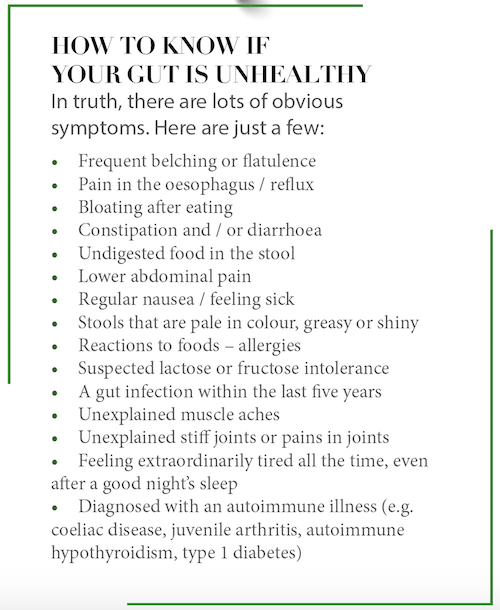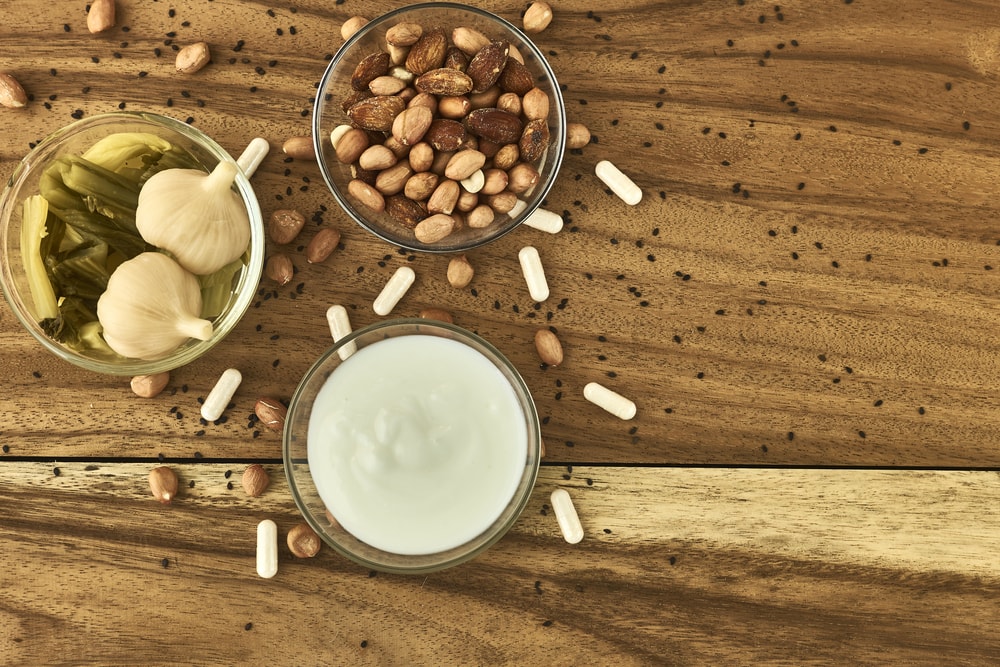A healthy gut is a key foundation for overall vitality. But what does a unhealthy gut feel like? And how can we solve the problem of leakiness?

Many common health complaints – whether its ongoing infections, eczema, allergies, asthma, IBS, digestive distress and nutritional deficiencies – can be traced to a key underlying factor: poor digestive health.
Indeed, the latest research reveals the state of our gut bacteria may be the key to boosting weight loss and even boosting mood. Here’s six top steps to getting your gut healthy.
1. Remove
The first step is to remove key gut triggers. These do not have to be long term, but try removing these foods for four weeks and see if your symptoms improve:
Alcohol and caffeine: Both can irritate the gut and disrupt blood sugar which can impact the gut. There are plenty of other options to try, such as dandelion coffee, or herbal and green teas instead.
Gluten grains: These can irritate the gut lining and are often difficult to digest, which can cause abdominal pain and bloating. Instead, pile your plates with gluten free grains and plenty of vegetables which can help your friendly bacteria to thrive.
Beans and pulses: These are often difficult to digest and can result in
bloating.
Dairy: For some people, dairy is a common allergen; although fermented dairy such as kefir and yogurt may be more easily tolerated. For others, it is not dairy proteins that cause the problem but lactose – which is a sugar in dairy products. Switching to lactose free dairy, or choosing lower lactose dairy like hard cheese and butter, may resolve symptoms.
Sugar/artificial sweeteners: These contribute to an imbalance in our gut flora and encourages potentially harmful bacteria and yeast to flourish (however, whole fruits are fine).
Many of these foods are called high FODMAP foods, which are short-chain carbohydrates or sugars which are poorly absorbed in the small intestine and readily fermented by gut bacteria producing gas which makes us bloat. They can also affect bowel motility, which can lead to alternating diarrhoea and constipation too.
2. Replace
Give your body a hand by including foods to stimulate digestive enzymes and stomach acid to help you break down and digest food more easily. Try lemon juice in warm water before meals, or drizzle apple cider vinegar over vegetables. Bitter tasting greens, like rocket and watercress, can also help. Other foods that contain digestive enzymes include pineapple and papaya.
3. Re-populate
Poor diet, stress, medications, even lack of sleep can all reduce the diversity of the friendly bacteria in our gut. Fermented foods like kefir, yogurt, sauerkraut, kimchi and homemade pickles, are packed with beneficial bacteria and are an easy way to naturally boost your levels.
Add in prebiotic food too – these are foods that provide fermentable fibres for the friendly bacteria, helping them to thrive in our guts. Good choices include oats, rice and rice bran, bananas, Jerusalem artichokes, asparagus, apples, leeks and onions.

4. RE-NOURISH
Calm the gut from inflammation and help support the gut lining with plenty of protein-rich foods and foods rich in collagen, like bone broth. If you struggle with indigestion then you may find slow-cooked foods like broths, stews and casseroles easier to digest. Add in some natural anti-inflammatory foods like turmeric, green tea, berries, ginger and garlic too.
5. RE-BALANCE
Watch stress and take steps to unwind. Mindful eating can be really helpful. Chew your food properly and take time to sit and eat your meals rather than eating on the go. Avoid eating too late – studies have shown you can improve digestive function if you can allow 12–14 hours overnight without eating. Aim to finish your evening meal by 7pm if you can.
6. RESET
If your stomach often feels heavy and full, or you struggle with poor blood sugar control and are looking to shed a few pounds, try intermittent fasting. Often referred to as the 5:2 diet, this can help digestive symptoms too. By allowing your digestive tract time to digest food without constantly snacking and overeating, you may find you feel lighter and less bloated. Do this a couple of times in a week and see if your symptoms improve.
Christine Bailey is the author of ‘The Gut Health Diet Plan: Recipes to Improve Digestive Health and Boost Wellbeing’ (Nourish Books, £12.99.)
To discover more about how you can improve your digestion and heal your unhealthy gut, visit Nutritionist Resource or use the search box below to find a nutritionist near you.


Comments